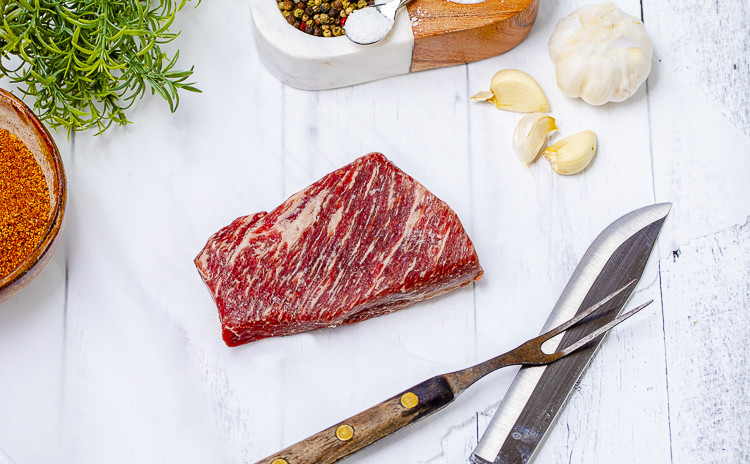Why Wagyu?
posted on
April 8, 2019
The Taste:
Because of the marbling gene that's highly up-regulated in Wagyu cattle (which is extremely dependent on them being in a low stress environment), Wagyu beef is intensely marbled. This factor, in addition to the fat being less saturated, creates a buttery flavor and aroma. You'll notice as you cook the meat that it's more of a delicacy than anything else. The incredible flavor leaves your mouth watering after every bite!

The Texture:
This one is a total game-changer for me! As I actually grew up not eating beef, the hardest thing to get used to when I did start eating it was the tough texture. However, this is not the case with Wagyu. Wagyu is known for "melting in your mouth"! This is literally what our customers say and it makes it such a different eating experience.
It also makes it much more kid and senior friendly. My Grandma, who has a really hard time eating due to teeth problems, hardly ever eats beef anymore. When she does, it's always ground because that's all she can handle. But when I was visiting for Christmas and brought some Wagyu steaks for the family to try, she actually ate a filet!! It was so exciting. And we have the same response from children who have a hard time with beef simply because of the texture. Kids love this stuff!

Heath Benefits:
Wagyu beef has a fatty acid profile similar to olive oil and salmon- when you eat Wagyu, you're getting the healthy fats that are good for the skin, hair, nails, and digestion, and heart health.
Wagyu is packed with your Omega 3's and has a remarkably high Omega 3:6 ratio. It has up to 30% more monounsaturated fat than normal beef due to the high marbling content, which is why the meat melts at a lower temperature.
More specifically, it's high in oleic acid (an Omega-9 polyunsaturated fat) which is shown to have anti-carcinogenic properties and aids in cancer prevention. When you're eating Wagyu, you're putting your body and your health first.
Not to mention that with our management practices, you're also eating a product that's free of GMO's, antibiotics, and hormones. Since our cattle are well-cared for, you're eating animal protein that had a great life on a small farm in a stress-free environment.

Wagyu History:
Cattle were brought to Japan from China in 2nd Century AD. The cattle were integrated into Japanese agriculture to increase efficiency in the cultivation of rice. Up until 1868, these cattle genetics were isolated. The first cross-breeding began during the Meiji Restoration when some 2600 foreign cattle were imported, including Braunvieh, Shorthorn, and Devon. The integration of these breeds with the native Japanese cattle became known as "Improved Japanese Cattle".
Four separate strains were characterized, based mainly on which type of foreign cattle had most influenced the hybrids. These were the four Wagyu breeds, including the Japanese Black or Kuroushi, the Japanese Brown or Akaushi, the Japanese Polled, and the Japanese Shorthorn. Our cattle are a cross of the Japanese Brown, or Akaushi bulls with Angus cows. This cross allows for the best characteristics of both breeds to be expressed. The superior marbling content and tenderness of the Wagyu combined with the finishing potential of the Angus is the perfect Japanese-American fusion that's ideal for the consumer and for us.





